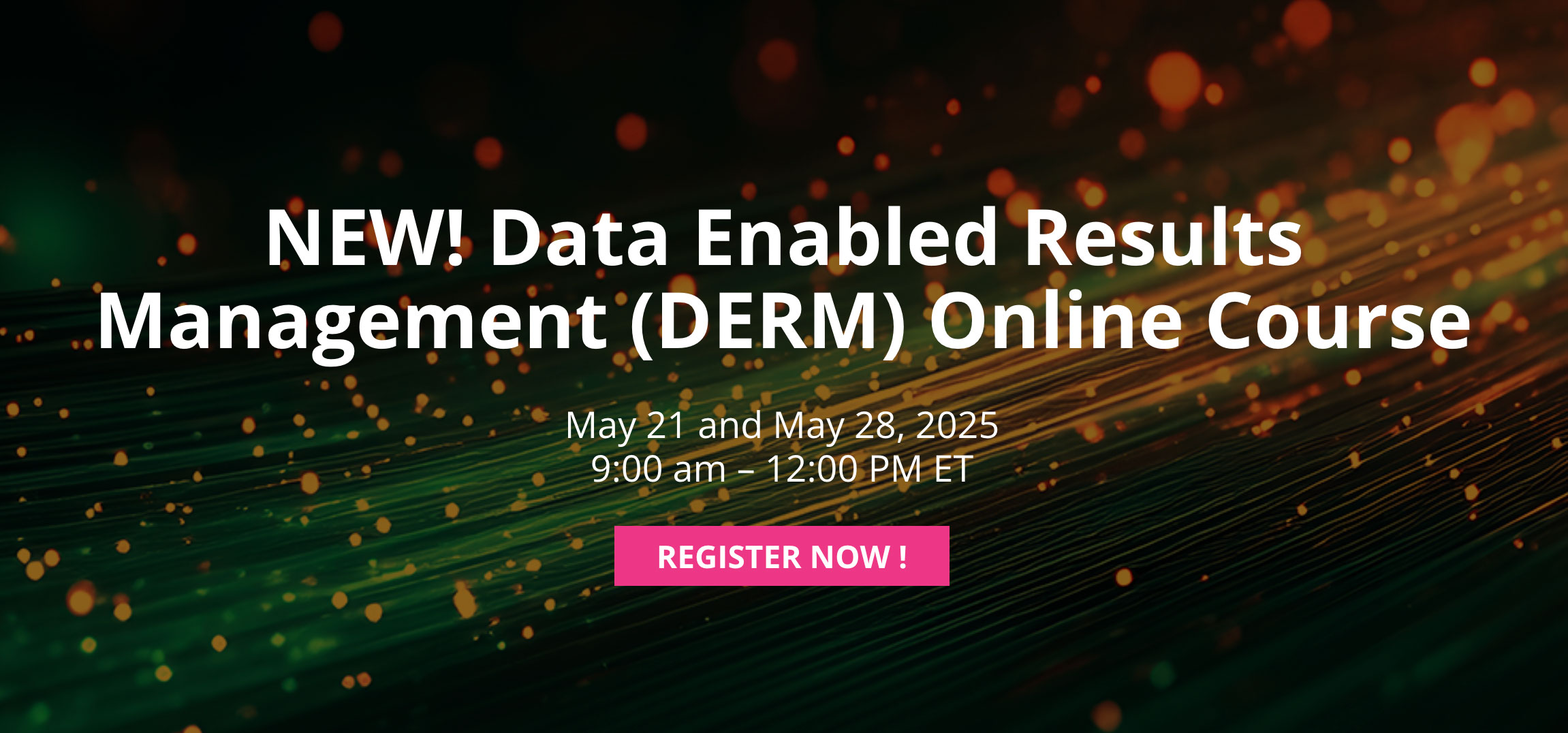May 21 and May 28, 2025
9:00 am – 12:00 PM ET
Wouldn’t it be useful to predict, with some level of certainty, whether your program is likely to meet its expected results? Wouldn’t it be helpful to be able to identify, again, with some degree of certainty, the level of resources needed to deliver on these results? Finally, to better manage programs, wouldn’t the capability to create what-if scenarios be of value?
This is the promise of DERM. Over the past ten years, Greg Richards’ research team has conducted surveys of over 1000 organizations, conducted dozens of case studies, and interviewed scores of managers in both the private and public sector to better understand how to use the data that surround us to improve program results.
A key challenge noted during this time was the inability to integrate internal and external data, but with today’s technological capabilities, this challenge can now be addressed.
Session 1: Wednesday May 21, 2025
9:00 am-12:00 pm ET
This session will establish the foundation for using data to manage results. We will start with an exploration of data and then examine the organizational factors that permit DERM to be successfully implemented. The session is hands-on. You will not need to prepare anything, but you should come ready to develop a DERM framework during the session and to assess your organization’s capability to support the implementation of this framework.
What you will learn:
- What do we mean by “data”? The different forms of data available for results management and how to use them.
- Levels of analytics-descriptive analytics helps us to understand the way things are, prescriptive analytics helps us anticipate what might be.
- Intelligent scorecards as a first step in descriptive analytics.
- Using descriptive and prescriptive analysis in efficiency and effectiveness metrics.
- How to design your own data-enabled results management framework.
- The characteristics of well performing organizations and the role of DERMin these organizations.
- Implementation strategies.
Session 2: May 28, 2025
9:00 am-12:00 pm ET
This session will review the previous content through a case study of a failed DERM implementation. Participants will have a chance to discuss the implementation strategy and provide recommendations to the organization. We will then look at a variety of advanced analytics models that you might use in your framework, discuss the different software and skill sets needed to apply these models, and address the human challenges involved. Finally, we will explore the concept of a performance-oriented culture.
What you will learn:
- Why DERM initiatives fail and what to do about it.
- Review: the intelligent scorecard as a descriptive model. The importance of historical data.
- How to assess analytics readiness.
- The lure of advanced analytics and how to avoid paralysis by analysis.
- Assessing cultural orientation: a performance-oriented culture as a context for DERM.
About the Instructor

Gregory Richards, MBA, Ph.D, FCMC,
Greg is currently Vice-Dean of Graduate Professional Programs at the Telfer School of Management at the University of Ottawa & Director of the Executive MBA program.
Prior to his work at the University, Greg launched a boutique consulting firm focused on designing performance management frameworks and processes that integrate data into management systems. He has been consulting on these topics for over 20 years working with government and private sector organizations. His work in government includes creating performance measurement frameworks for agencies, regular departments, crown corporations, and not-for-profit organizations. He has worked on difficult-to-measure frameworks such as emergency response (where the best result is no result).
He was a public servant at Transport Canada and at PSPC before moving into consultancy and subsequently into academia. He has published over fifty peer-reviewed papers on performance management & information use in organizations and an edited book on Analytics in Government. Greg is a Certified Management Consultant and a Fellow of the Institute. He is an Academic Fellow and was past Chair of the Eastern Ontario Chapter of CMC-Canada and Chair of the National Certification Committee responsible for designing the certification exam for CMCs. He continues to consult with organizations seeking to use data to improve results.
Dates and Details of Delivery:
May 21 and May 28, 2025
9:00 am – 12:00 pm ET
The sessions will be conducted online using Zoom.
Registration Fees:
DERM Course Fee $500, plus HST




